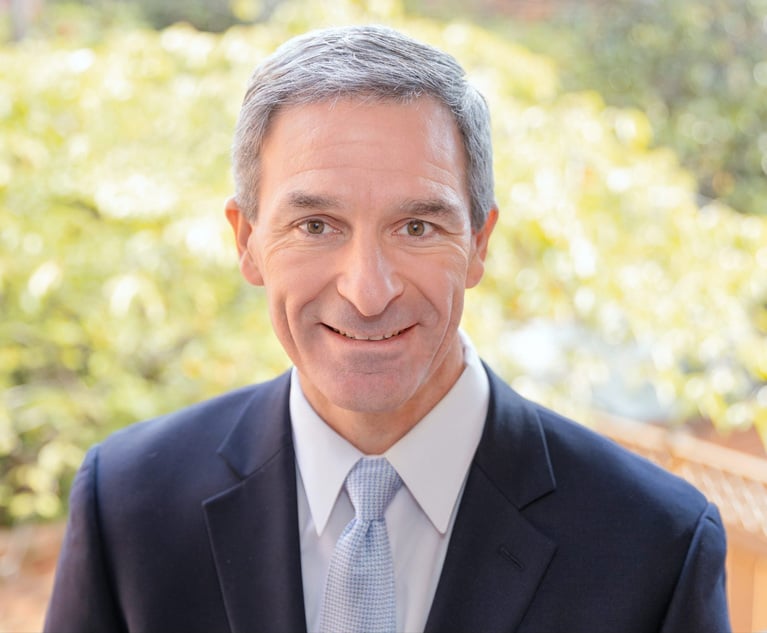 Bruce Heiman is a partner at global law firm K&L Gates and is a member of the Public Policy and Law Group. Courtesy photo
Bruce Heiman is a partner at global law firm K&L Gates and is a member of the Public Policy and Law Group. Courtesy photo Why This Section 230 Case?
The U.S. Supreme Court is taking on the Gonzalez v. Google case. Let's hope the current court keeps Justice Holmes's admonition in mind when considering any limits to Section 230 protections.
January 17, 2023 at 09:00 AM
4 minute read
CommentaryThe Supreme Court has decided in the context of national security to consider the parameters of, and possible limits to, "Section 230" liability protections for social media companies. Specifically, the court in Gonzalez v. Google will consider whether Google, through its YouTube service, should be held responsible for "aiding and abetting" terrorism because its algorithm recommended a terrorist group's videos to other users. The court also agreed to hear a related case involving Google, Twitter and Facebook in which posts allegedly played a role in another terrorist attack.
Section 230 of the Telecommunications Act of 1996 immunizes social media companies from liability for what third parties post to their websites and online platforms. Section 230, sometimes called the 26 words that created the Internet, states "No provider or user of an interactive computer service shall be treated as the publisher or speaker of any information provided by another information content provider." Section 230 also protects social media companies from actions taken in good faith to take down or limit the availability of material they find objectionable.
This content has been archived. It is available through our partners, LexisNexis® and Bloomberg Law.
To view this content, please continue to their sites.
Not a Lexis Subscriber?
Subscribe Now
Not a Bloomberg Law Subscriber?
Subscribe Now
NOT FOR REPRINT
© 2025 ALM Global, LLC, All Rights Reserved. Request academic re-use from www.copyright.com. All other uses, submit a request to [email protected]. For more information visit Asset & Logo Licensing.
You Might Like
View All


Restoring Antitrust: Returning to the Consumer Welfare Standard
Law Firms Mentioned
Trending Stories
- 1Retention, Development and 'Empowering Teams': This Am Law 200 Firm's Newest Practice Leader Says Objectives Haven't Changed
- 2From Laggards to Tech Founders: Law Firm Innovation Is Flourishing
- 3Judge Receives Supreme Court Reprimand: 'Your Behavior Was Unacceptable'
- 4Contracts Game Changer? One-Sided ADR Provision Overturned
- 5Attorney Says Seeking Justice for Inmate's Death Requires Systemic Change as Well as Compensation
Who Got The Work
J. Brugh Lower of Gibbons has entered an appearance for industrial equipment supplier Devco Corporation in a pending trademark infringement lawsuit. The suit, accusing the defendant of selling knock-off Graco products, was filed Dec. 18 in New Jersey District Court by Rivkin Radler on behalf of Graco Inc. and Graco Minnesota. The case, assigned to U.S. District Judge Zahid N. Quraishi, is 3:24-cv-11294, Graco Inc. et al v. Devco Corporation.
Who Got The Work
Rebecca Maller-Stein and Kent A. Yalowitz of Arnold & Porter Kaye Scholer have entered their appearances for Hanaco Venture Capital and its executives, Lior Prosor and David Frankel, in a pending securities lawsuit. The action, filed on Dec. 24 in New York Southern District Court by Zell, Aron & Co. on behalf of Goldeneye Advisors, accuses the defendants of negligently and fraudulently managing the plaintiff's $1 million investment. The case, assigned to U.S. District Judge Vernon S. Broderick, is 1:24-cv-09918, Goldeneye Advisors, LLC v. Hanaco Venture Capital, Ltd. et al.
Who Got The Work
Attorneys from A&O Shearman has stepped in as defense counsel for Toronto-Dominion Bank and other defendants in a pending securities class action. The suit, filed Dec. 11 in New York Southern District Court by Bleichmar Fonti & Auld, accuses the defendants of concealing the bank's 'pervasive' deficiencies in regards to its compliance with the Bank Secrecy Act and the quality of its anti-money laundering controls. The case, assigned to U.S. District Judge Arun Subramanian, is 1:24-cv-09445, Gonzalez v. The Toronto-Dominion Bank et al.
Who Got The Work
Crown Castle International, a Pennsylvania company providing shared communications infrastructure, has turned to Luke D. Wolf of Gordon Rees Scully Mansukhani to fend off a pending breach-of-contract lawsuit. The court action, filed Nov. 25 in Michigan Eastern District Court by Hooper Hathaway PC on behalf of The Town Residences LLC, accuses Crown Castle of failing to transfer approximately $30,000 in utility payments from T-Mobile in breach of a roof-top lease and assignment agreement. The case, assigned to U.S. District Judge Susan K. Declercq, is 2:24-cv-13131, The Town Residences LLC v. T-Mobile US, Inc. et al.
Who Got The Work
Wilfred P. Coronato and Daniel M. Schwartz of McCarter & English have stepped in as defense counsel to Electrolux Home Products Inc. in a pending product liability lawsuit. The court action, filed Nov. 26 in New York Eastern District Court by Poulos Lopiccolo PC and Nagel Rice LLP on behalf of David Stern, alleges that the defendant's refrigerators’ drawers and shelving repeatedly break and fall apart within months after purchase. The case, assigned to U.S. District Judge Joan M. Azrack, is 2:24-cv-08204, Stern v. Electrolux Home Products, Inc.
Featured Firms
Law Offices of Gary Martin Hays & Associates, P.C.
(470) 294-1674
Law Offices of Mark E. Salomone
(857) 444-6468
Smith & Hassler
(713) 739-1250









